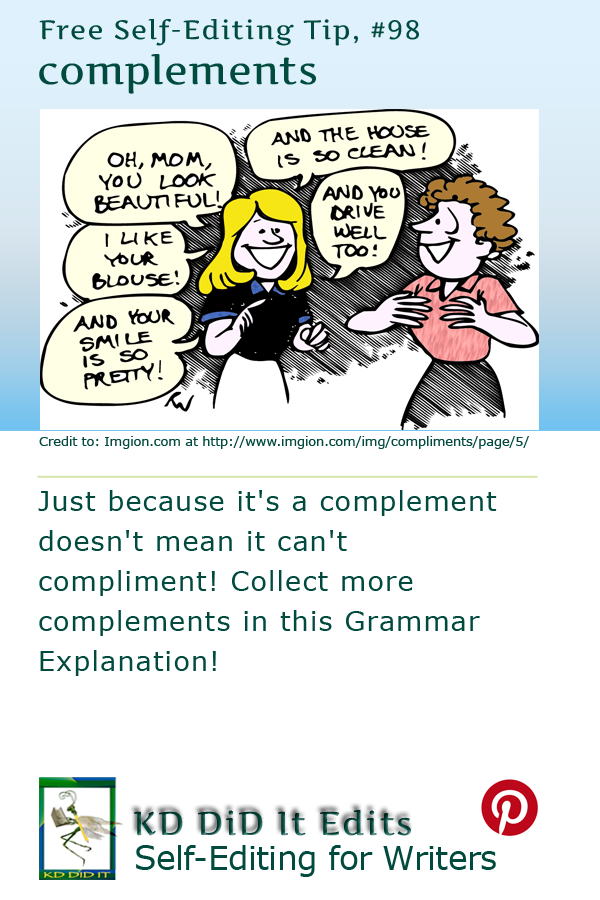There are compliments, and then there are complements (for more on the difference see the “Word Confusion: Complement versus Compliment“).
In this case, the concern is with the grammatical complement: a word(s), phrase, or clause that comes after the verb and provides further information about a subject, an object, or another verb and completes the meaning of the sentence.
Grammar Explanations is…
…an evolving list of the structural rules and principles that determines where words are placed in phrases or sentences as well as how the language is spoken. Sometimes I run across an example that helps explain better or another “also known as”. Heck, there’s always a better way to explain it, so if it makes quicker and/or better sense, I would appreciate suggestions and comments from anyone… Are there areas of grammar with which you struggle? If you’d like to track it, bookmark this page and consider sharing this Grammar Explanation with friends by tweeting it.
| Complement | |||
| Credit to: Capital Community College Foundation’s Guide to Grammar and Writing | |||
| Definition: A word or word group that comes after the verb and tells us more about a subject, an object, or a verb to complete the meaning of a sentence.
It may include action or linking verbs, each of which has a different kind of complement. There are three types of complements:
|
|||
| Object Complement | |||
| Definition: It can be a noun, adjective, or any word acting as a noun or adjective.
Rule: Follows and modifies or refers to a direct object |
|||
|
Legend:
The convention named Dogbreath vice president to keep him happy. Vice President complements Dogbreath, tells us that Dogbreath has been named the v-p; the adjective happy complements the object him and tells us who is happy. The clown got the children too excited. The verb excited tells us how the object, the children, feel. Drinking red wine helps. Red wine complements drinking. |
|||
| Subject Complement | |||
| Definition: It is an adjective or a noun that renames or defines the subject in some way.
There are two types of subject complements:
Rule: Follows the verb be and other linking verbs to link the subject to a predicate noun or a predicate adjective. |
|||
|
Legend:
A glacier is a huge body of ice. Glaciers are beautiful and potentially dangerous at the same time. This glacier is not yet fully formed. Ilya Kurovich is our acting coach. Margo Babbage was once a famous actress. John seems quite confident. The clouds in the sky grew agitated. |
|||
| Verb Complement | |||
| Definition: The arrangement of one verb as the direct or indirect object of another verb and is needed to complete the meaning of a sentence. | |||
|
Legend:
Granny left Raoul all her money. Fred did not like his brother. Jack stole the pie. She read the book. They ate all the chocolate. Betty gave her brother the secret code. Then she sent him a message. She said she would lend him the money. |
|||
| With Infinitive | |||
I asked her to read. I wanted to read. I helped him to read. I stopped for the child to cross the street. |
|||
| With Gerund | |||
I considered reading on the job. I regretted his reading on the job. They decided on reading together. |
|||
| With Noun Clause | |||
I insisted that he read. I wondered why he hadn’t read the book. She agreed that she had read on the job. He didn’t know that she had been reading. She decided when she would read. |
|||



